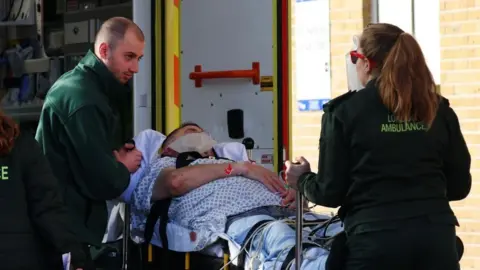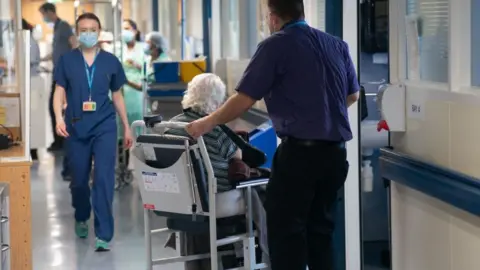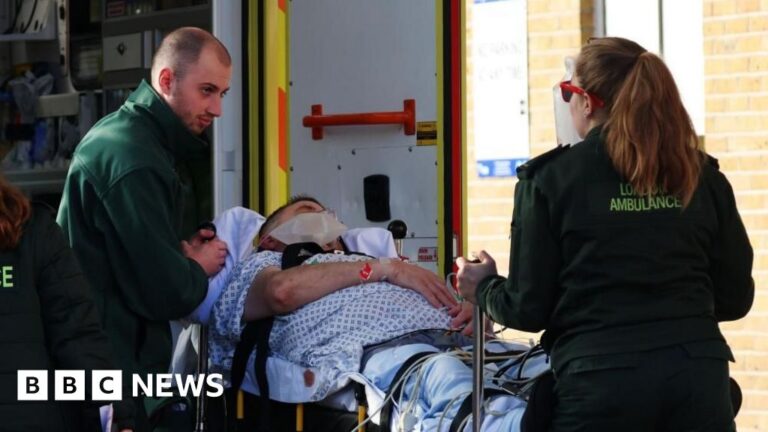 EPA
EPAA leading health think tank says urgent and emergency care in England is performing “far worse” than before the pandemic.
The Health Foundation argues that the NHS was “in distress” this winter with A&E waiting times reaching a record high.
The group says it would be wrong just to blame relatively high levels of flu.
The government is due to publish an urgent and emergency care plan soon. The Department for Health and Social Care said that hospitals were “feeling the strain” but that it was taking “decisive action” to prevent winter crises.
The Health Foundation report on the recent winter says that the number of people waiting 12 hours or more in A&E after a decision to admit to a ward was the highest since modern records began. It topped 60,000 in January, or 11% of emergency admissions.
The report says that a familiar problem remains as acute as ever – delays discharging patients from hospital who are fit to leave. This, it says, made bottlenecks worse in A&E and for ambulances trying to hand over patients and that delays for those handovers were worse than in previous winters.
The authors acknowledge that flu cases in hospitals were higher than usual but no worse than in the winter of 2022-23 – though the number took longer to fall than in that year.
Hospital patients with the winter vomiting bug norovirus were also more numerous than in many winters.
But hospital admissions for the respiratory virus RSV were similar to previous winters, and Covid admissions remained relatively low. Overall emergency hospital admissions fell slightly compared to the previous winter, as did the number of people going into major A&E units.
The authors argue that the NHS should be prepared for winters like this one and that blaming external factors such as winter bugs risked offering “false comfort” about the state of the health service.
Tim Gardner, assistant director at the Health Foundation, said an annual winter crisis did not have to be inevitable and the analysis should be a “wake up call to the government to focus on the underlying issues”.
 PA Media
PA MediaA Department for Health and Social Care spokesperson said: “Despite our actions to protect patients during the colder months, including vaccinating more people than last winter, we know hospitals are feeling the strain.
“Annual winter pressures should not automatically lead to an annual winter crisis.” It says its “decisive action” included ending the junior doctors’ strikes and rolling out the country’s first RSV vaccine.
The Royal College of Emergency Medicine said in response to the report there was a “clear roadmap” and that the urgent and emergency care plan and a 10-year plan for the NHS, which are both due soon, offered “an unmissable opportunity to implement changes that are so desperately needed”.
In a separate move the Department of Health and Social Care said a target for increasing the number of hospitals in England allowing patients to view appointments through the NHS app had been exceeded. The target was 85% by March and the outcome was 87%, up from 68% last July, it said.
The department also said because more patients could get access to correspondence via the app, 12 million fewer letters had been sent since July. There were 1.5 million fewer missed appointments, it said. Ministers said this was helping cut waiting lists and saving taxpayers money.




